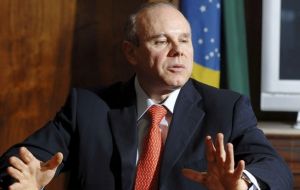MercoPress. South Atlantic News Agency
Argentina/Brazil set to grow 5%, helping to ease bilateral “trade relations”
 Guido Mantega anticipates closer and more fluid bilateral relations
Guido Mantega anticipates closer and more fluid bilateral relations Argentina and Brazil closed Friday in Buenos Aires two days of high level negotiations which should help ease bilateral trade relations tension particularly since both countries economies are forecasted to grow at 5% during 2010.
The talks which ranged from the two countries position in the G-20 group coming discussions to the non automatic import licences which severely limit and irritate exporters of both countries ended with “favourable prospects” reaffirming the strategic relation between Mercosur main members and Latinamerica’s first and third economies.
The delegations were headed by Finance, Foreign Affairs and Industry ministers: Amado Boudou, Jorge Taiana and Deborah Giorgi for Argentina and Guido Mantega, Celso Amorim and Miguel Jorge in representation of Brazil.
“Prospects are far more favourable. The two economies are already growing at rates higher than those of the EU and US economies. Argentina and Brazil should manage a comfortable 5% this year”, pointed out Finance minister Mantega.
He also downplayed the effects of the recent stock market losses al world level: “they are temporary and won’t have an impact on world recovery”.
Argentina’s Boudou said that holding these sorts of meetings every 90 days have helped avoid trade problems between “two very important business partners” and downplayed the alleged conflicts of the recent months: “they represent less than 10% of the existing trade between both countries”.
Boudou anticipated that Argentina and Brazil are coordinating positions to present at G20 a joint project to regulate world markets and introduce modifications to the workings of the Inter American Development Bank, IDB.
Mantega was particularly caustic about the IDB saying “it did not have a satisfactory performance; it has not complied with its tasks” and a “new more efficient management system will be proposed to the benefit of the region and the bank”.
The two ministers decided the creation of a bilateral commission with members from both countries tax-revenue offices in an attempt to unlock Mercosur Common Customs Code which remains stalled, and putting an end to the double tariff system which in absence of the code prevails.
Argentina’s Foreign Affairs Minister Jorge Taiana pointed out “the positive spirit” of the bilateral meeting, underlining “the importance of the accords between both countries that allowed us to break through the international crisis”.
The two ministers held a side meeting at San Martín Palace as part of the round of talks regarding the reduction of non-automatic import licenses by both nations.
Argentine Industry Secretary Eduardo Bianchi, Brazilian Development Secretary Iván Ramalho and Trade Under-Secretary Welber Barral later announced that there was an agreement to analyze the current application of non-automatic import licenses.
The bilateral trade conflict burst out in 2008 when Argentina applied non-automatic licensing for various Brazilian products, affecting 15% of goods coming from its neighbouring country. In response, the government of Lula da Silva implemented a series of non-automatic licensing on Argentine perishable goods and certain industrial products.
“There are some sectors that were included with the start of the financial crisis”, recalled Minister Giorgi implying the time has come to gradually dismount them. She added both countries will manage a “positive agenda” to work for the export to third-country markets and access higher external investments.
Industry minister Miguel Jorge admitted that last year there had been complaints from Brazilian exporters about Argentine impediments, but following the meeting of presidents Cristina Fernandez de Kirchner and Lula da Silva the “situation eased considerably”.




Top Comments
Disclaimer & comment rules-

Read all commentshttp://www.footbing.com/products/Mens-Footwear-c1_p1.html
Feb 08th, 2010 - 06:24 am 0christian shoes
Commenting for this story is now closed.
If you have a Facebook account, become a fan and comment on our Facebook Page!